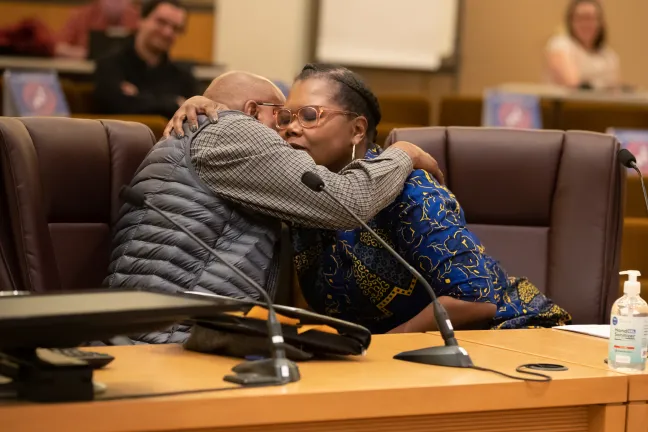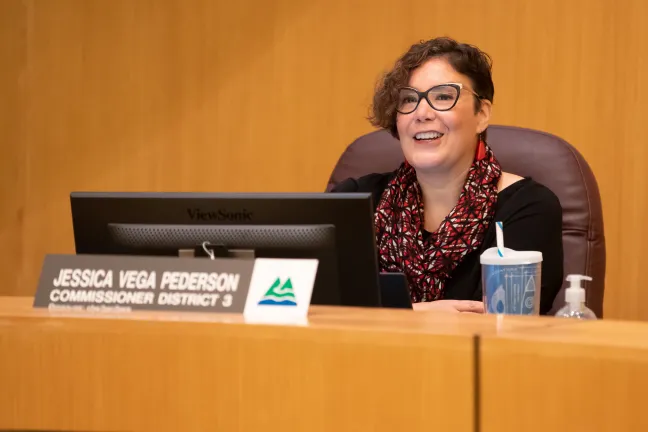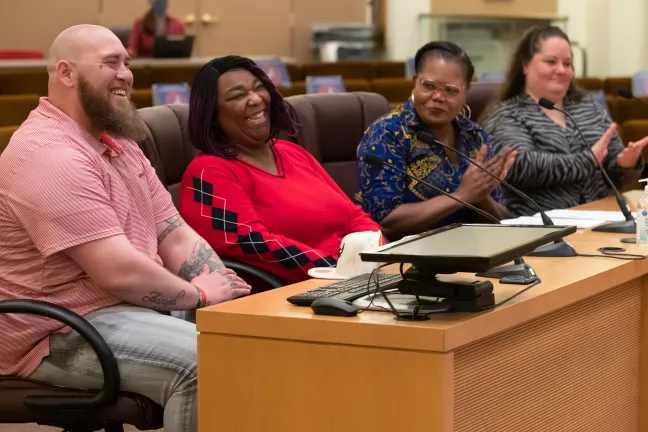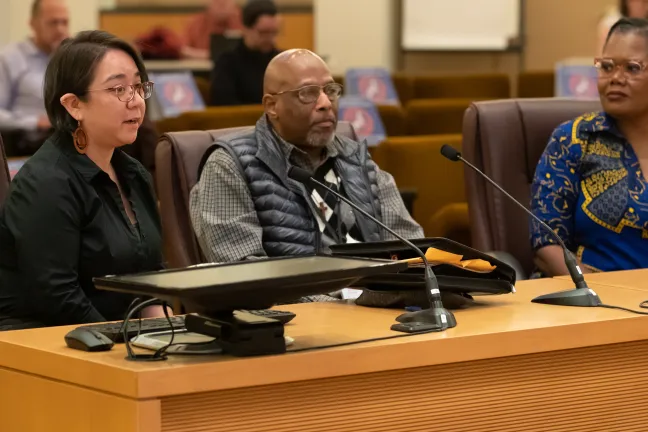Multnomah County’s Board of Commissioners proclaimed the month of April 2022 as Second Chance Month, in recognition of the hundreds of thousands of people who make the challenging transition of returning to their community after incarceration.
Recognized nationwide, Second Chance Month raises awareness about the challenges those individuals face, and the kinds of support they need in order to find closure and move forward.
The observance also draws attention to efforts to help those who have served their time rebuild their lives by increasing access to housing, employment and education, as well as opportunities to volunteer and regain their right to vote.
Thursday’s proclamation, sponsored by Commissioner Jessica Vega Pederson, highlighted several local organizations that work alongside Multnomah County’s Department of Community Justice (DCJ) to help people make that transition, including SE Works and Central City Concern.
“I feel lucky to live in a place where we acknowledge that being human also means being imperfect,” said Commissioner Vega Pederson, who opened the proclamation.
“And we understand that no one should be defined by their biggest mistake. Giving someone a second chance means giving them a fair-paying job, affordable housing, trauma-informed healthcare, mentorship and a role to play in their community. A second chance is the ability to stand strong and find opportunity after overcoming adversity.”
Of the 831 individuals released from state custody in 2021, 754 required housing assistance, 460 were identified as persons who could use mental health supports, 196 had medical mobility issues, and 29 were identified with a cognitive disability or an intellectual disability. Many of them returned home to Multnomah County.
The County’s Department of Community Justice provides supervision and connection to treatment for these youth and adults, while supporting their families, too. DCJ’s Transition Services Unit (TSU), based in downtown Portland, provides basic core services that are vital to people involved in the justice system during their initial stages of reintegrating into the community.
“For most, the transition process can be a daunting experience, particularly for those individuals lacking safe, stable and secure housing, and essential resources such as food, clothing and transportation,” said DCJ Director Erika Preuitt. “The TSU helps with addressing the various issues and obstacles that impede and influence the reentry process.”
The TSU team also works in tandem with the co-located Health Assessment and Treatment (HAT) Team, which supports individuals who have serious and chronic health issues from enrolling clients with a primary care provider, finding a pharmacist, assisting in obtaining vital records, and connecting to safety nets like Supplemental Nutrition Assistance Program (SNAP).
“The absence of basic services and resources can negatively affect a justice-involved individual’s supervision experience, often precipitating further criminal behavior and a return to the criminal justice system,” said Preuitt.
We value our collaboration and partnership and rely on our community partners to do this work, continued Preuitt. “Two of which are here today to join us to recognize Second Chance Month.”
SE Works and WorkSource Portland Metro
Linda Hastings, SE Works Community and Justice Program Manager, described the depth and reach of her organization’s reentry programs.
Since 1997, SE Works has been a leader in employment and training programs for youth and adults involved in the justice system. The organization helps any justice-involved individual who seeks services, she stressed.
“We are proud of our motto: ‘Any crime, any time.’ We exclude no one,’” said Hastings.
Multnomah County funds several SE Works programs, including:
- DCJ’s New Start Reentry Resource Center, a stabilization and employment program dedicated to helping newly released individuals successfully reenter community after incarceration from jail and state institutions within the last two years.
- A pre-release workforce development program through the Multnomah County Sheriff’s Office’s Inverness Jail. The program supports employment-focused workshops for adults in custody and connections to supportive services once they are released. Potential employers are invited to meet virtually with adults in custody.
Referrals come by word of mouth, family members, a friend or parole and probation officer.
“Our work is our passion,” said Hastings. “And our passion is to ensure each person walking through our doors has an opportunity to redefine themselves and to be judged on skills and abilities — not their background.’’
Brett Andre was a participant in the New Start Reentry Resource Center program. Before the board members, he shared candidly about the life changes he experienced through his connection with SE Works Case Manager Kiva Antilla.
“I come from a broken home with no father,” said Andre. “I had a single mom who did everything she could to take care of me and raise me the best she could.”
Andre struggled in school. He landed in various alternative schools. Eventually, he shared, “I started running away, and with that came drugs, violence and more drugs.”
He eventually served time in prison. But three months before his release, he met Antilla. Upon his release, Anitlla helped provide clothes, bus vouchers, and a foundation to stand on for gainful employment.
“Kiva and the New Start program served as the foundation” for his transition back into the community, Andre said.
“When you come out and you have nothing and no one to back you or steer you in the right direction, it can lead you back to committing crime and drugs or crime.”
Six months ago, Andre gained employment as a line cook for the Wendy’s franchise.
“And today, I stand before you as a general manager,’’ he said.
“There’s really hope for people that have the foundation set for them... There is a better life. I thank you for letting me come before you and share about myself.”
“We seem to live in thankless times, but today SE Works wants to specifically call out those who have supported our work over the years, including Erika Preuitt, Jay Scroggin, Adult Services Division Director for Multnomah County's Department of Community Justice, Liv Jenssen, Multnomah County Manager of Transition Services and staff at the Multnomah County Sheriff’s Office,” said Hastings.
“A big thank you to all the POs we work with each day,” she added. “We are honored to work with such a committed and caring group of individuals.”
Central City Concern
Billy Anfield, an Advocacy Coordinator for Central City Concern, highlighted the work of Flip the Script, Central City Concern’s re-entry program for Black men and women released from prison and jail. The program launched in 2017.
The program, Anfield said, was conceived of, designed and implemented by an African American Central City Concern staff member who had served time at Coffee Creek Correctional Facility, based on her firsthand experience with navigating barriers after her release
“And when we were looking for money to support this program,” said Anfield, “the Department of Community Justice funded our program.”
Referrals to Flip the Script come from probation and parole officers or case managers in transitional housing settings. Staff members are African American, which “allows us to embrace enrollees and referrals from an Afrocentric point of view,’’ said Anfield.
Flip the Script helps participants gain housing and employment, offers culturally responsive case management and peer mentoring, and gives them opportunities to practice advocacy on issues relevant to their circumstances.
“Our slogan is ‘A small setback for a major comeback,’” said Anfield, “which equates to why we’re here today for Second Chance (Month).”
Recidivism rates among Flip the Script participants have also been encouraging, shared Anfield. Alumni who have been in the program for three to five years have not committed crimes or returned to prison.
“This program is a diamond in the rough. It’s the smallest and mightiest program at Central City Concern,” said Anfield.
The program also includes an advocacy arm. Flip the Script participants meet every third Saturday of the month to identify priorities and plan for speaking before the Oregon State Legislature. The group played a large role in testimony crafting Senate Bill 1510 related to traffic stops.
Mercedes Elizalde, Central City Concern’s director of public policy, described the work of elevating the voices of Flip the Script clients at Oregon’s Capitol as “truly something that is visionary and inspiring.’’
“Many of these policy changes are not retroactive,’’ she continued. “They’re putting their voice forward to change the system, that may not change their conditions or barriers, but they’re reaching back to ensure the community moving forward is more stable, healthy and better connected.”
“I can’t say enough about the ability to share their stories and connect their stories to policy.”
On behalf of the Flip the Script team, clients and their family members, Anfield presented Preuitt with a Flip the Script t-shirt.
Clearly moved, Preuit thanked Anfield.
“This is why we come to work every single day.“
“It is so important that we hear the details of the services you provide,” said Multnomah County Commissioner Susheela Jayapal.
“We read them in purchase offers and budgets but when you come and share, it really makes it come alive and reinforces the importance of funding the programs that we fund.”
“There is so much that is possible, there is so much potential,” said Multnomah County Commissioner Sharon Meieran. “I’m grateful that you are seizing that potential and working with people at the right time to bring that together.”
Watch the full board meeting here.



